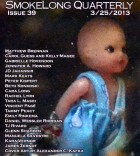Tell me about the way this piece began.
I suppose not unlike how many short pieces (and longer ones) have: snatches of memories, unrequited desires and mischief, all tied together with sideways knots. I was thinking of a few different ideas—the aftermath of Hurricane Sandy, disruption of comfortable lives, and a tiny bit about American imperialism among the best-intentioned of us.
I love how water works in this story—how water floods and cleans and pushes and moves. Tell me about the way water envelopes here. The heaviness of water and how it affects the narrator and his art.
Water has such strong metaphorical qualities, yet it is also something very real and dangerous, completely capable of rearranging and destroying lives if we make the mistake of taking its ubiquity for granted. I thought it would be cool for something as typically lyrical and device-like as flowing water to actually come along and completely disrupt a wannabe writer’s apocryphal life. I may be wrong, but it might have helped him.
The narrator does not tell the Haitian woman about her impact on his art because “he was not really a writer.” If he was not a writer, what was he? What is he? Would you even describe him as an artist? Why or why not?
Many writers, in my experience, struggle with the epithet “writer”—wait, or is that just me—when they are scribbling away in their basements, still too thin-skinned for the light of day, and friends. I imagined the protagonist to be one of those guys, not quite ready to open the door, but struggling with a book that is withering away before he has had the chance to even finish it. It is the fear of not getting a fighting chance. Also, clearly he is a guy who walks around with a bunch of the liberal/progressive’s guilt on his back, without a full appreciation of what it might all mean. All this informs his comfort factor of committing to be an artist or whatever.
Tell me about Rose-Marie.
Rose-Marie, is the only person who I wanted to have a name in the story. I wanted to write her with as few strokes as I could. She is the beleaguered wife, on whose bed he is allowed to dream about dangerous things. Man, talk about beleaguered.
The right to name: This element of the story fascinates me. Does anyone really have that right? Or would you say this is more of a privilege?
A writer names his characters, establishes identities and histories and thereby establishes full dominion over them. We, in the west, write the books and tell the stories of the “other” without a full understanding their reality. The intentions are good and certainly not evil, but we are horribly flawed observers and reporters; and then there are the hidden horses in the race. So yes, naming is a privilege that can only be given freely between consenting adults. The interesting question then is whether one has the willingness to accept one’s history to be created by another.
If you could tell the narrator one thing, what would it be?
Real writer or not, finish the damn book.



 The core workshop of SmokeLong Fitness is all in writing, so you can take part from anywhere at anytime. We are excited about creating a supportive, consistent and structured environment for flash writers to work on their craft in a community. We are thrilled and proud to say that our workshop participants have won, placed, or been listed in every major flash competition. Community works.
The core workshop of SmokeLong Fitness is all in writing, so you can take part from anywhere at anytime. We are excited about creating a supportive, consistent and structured environment for flash writers to work on their craft in a community. We are thrilled and proud to say that our workshop participants have won, placed, or been listed in every major flash competition. Community works.